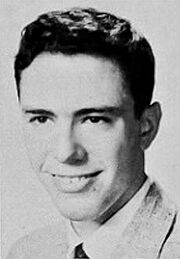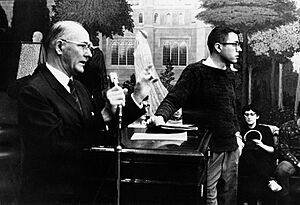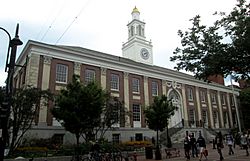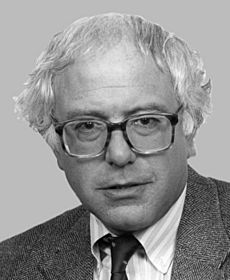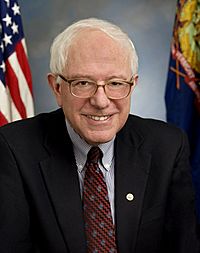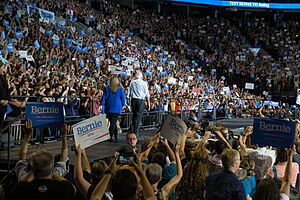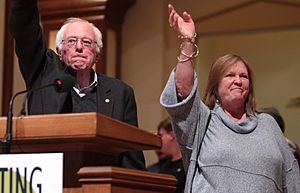Bernie Sanders facts for kids
Quick facts for kids
Bernie Sanders
|
|||||||||||||||||||||||||||||||||||||||||||||||||
|---|---|---|---|---|---|---|---|---|---|---|---|---|---|---|---|---|---|---|---|---|---|---|---|---|---|---|---|---|---|---|---|---|---|---|---|---|---|---|---|---|---|---|---|---|---|---|---|---|---|
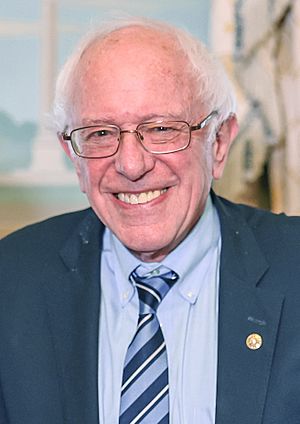
Sanders in 2023
|
|||||||||||||||||||||||||||||||||||||||||||||||||
| United States Senator from Vermont |
|||||||||||||||||||||||||||||||||||||||||||||||||
| Assumed office January 3, 2007 Serving with Peter Welch
|
|||||||||||||||||||||||||||||||||||||||||||||||||
| Preceded by | Jim Jeffords | ||||||||||||||||||||||||||||||||||||||||||||||||
|
|||||||||||||||||||||||||||||||||||||||||||||||||
| Member of the U.S. House of Representatives from Vermont's at-large district |
|||||||||||||||||||||||||||||||||||||||||||||||||
| In office January 3, 1991 – January 3, 2007 |
|||||||||||||||||||||||||||||||||||||||||||||||||
| Preceded by | Peter Plympton Smith | ||||||||||||||||||||||||||||||||||||||||||||||||
| Succeeded by | Peter Welch | ||||||||||||||||||||||||||||||||||||||||||||||||
| Mayor of Burlington | |||||||||||||||||||||||||||||||||||||||||||||||||
| In office April 6, 1981 – April 4, 1989 |
|||||||||||||||||||||||||||||||||||||||||||||||||
| Preceded by | Gordon Paquette | ||||||||||||||||||||||||||||||||||||||||||||||||
| Succeeded by | Peter Clavelle | ||||||||||||||||||||||||||||||||||||||||||||||||
| Personal details | |||||||||||||||||||||||||||||||||||||||||||||||||
| Born |
Bernard Sanders
September 8, 1941 New York City, U.S. |
||||||||||||||||||||||||||||||||||||||||||||||||
| Political party | Independent (since 1978) | ||||||||||||||||||||||||||||||||||||||||||||||||
| Other political affiliations |
|
||||||||||||||||||||||||||||||||||||||||||||||||
| Spouses |
|
||||||||||||||||||||||||||||||||||||||||||||||||
| Children | 4 | ||||||||||||||||||||||||||||||||||||||||||||||||
| Relatives | Larry Sanders (brother) | ||||||||||||||||||||||||||||||||||||||||||||||||
| Education | |||||||||||||||||||||||||||||||||||||||||||||||||
| Signature | |||||||||||||||||||||||||||||||||||||||||||||||||
Bernard "Bernie" Sanders (born September 8, 1941) is an American politician. He is one of two United States senators from Vermont. He is the longest-serving independent (a politician not belonging to a major party) in the history of the U.S. Congress.
Even though he is an independent, Sanders works closely with the Democratic Party. He ran for the Democratic presidential nomination in 2016 and 2020. Sanders is known as a leader of the American progressive movement. This movement supports new ideas for social and political change that benefit working people.
Sanders was born in New York City. He became active in the civil rights movement as a college student. In 1981, he was elected mayor of Burlington, Vermont's largest city. He was later elected to the U.S. House of Representatives and then the U.S. Senate in 2006.
His presidential campaigns were famous for their focus on issues like income inequality and for raising money from many small online donations instead of large corporate donors. He supports ideas like universal healthcare, tuition-free college, and taking strong action on climate change.
Contents
Early Life and Education
Bernard Sanders was born on September 8, 1941, in Brooklyn, New York. His father, Elias, was a Jewish immigrant from Poland who worked as a paint salesman. Many of his relatives in Poland were killed during the Holocaust. This family history made Sanders interested in politics from a young age.
Sanders grew up in a working-class family. He attended James Madison High School, where he was captain of the track team. He lost his first election for student body president. His campaign focused on raising money for orphans of the Korean War.
After high school, Sanders attended Brooklyn College for a year. He then transferred to the University of Chicago, where he graduated in 1964 with a degree in political science. He said that he found community activism and protests more educational than his classes.
Start of His Career
Civil Rights Activism
While in Chicago, Sanders became a student organizer for the civil rights movement. He joined groups like the Congress of Racial Equality (CORE) and the Student Nonviolent Coordinating Committee (SNCC). These groups fought against racial segregation.
In 1962, he led protests against the University of Chicago's policy of segregated student housing. He and 32 other students held a sit-in, camping outside the university president's office for weeks. The university eventually ended its segregation policy. In 1963, he was fined $25 for resisting arrest during a protest against segregation in Chicago's public schools.
Sanders also attended the famous 1963 March on Washington for Jobs and Freedom. This is where Martin Luther King Jr. gave his "I Have a Dream" speech. During the Vietnam War, Sanders applied for conscientious objector status because he was against the war.
Moving to Vermont
After college, Sanders worked several jobs in New York City. In 1968, he moved to Vermont because he was "captivated by rural life." He worked as a carpenter, filmmaker, and writer.
He began his political career with the Liberty Union Party, a small party that was against the Vietnam War. He ran for governor and U.S. senator several times in the 1970s but did not win. In 1977, he left the party and became an independent writer. He also made a documentary about the American labor leader Eugene V. Debs.
Mayor of Burlington (1981–1989)
In 1981, Sanders ran for mayor of Burlington, Vermont's largest city. He ran as an independent and surprised everyone by winning by just 10 votes. He was reelected three times, serving a total of eight years.
As mayor, Sanders called himself a socialist. His supporters formed the Progressive Coalition, which later became the Vermont Progressive Party. Under his leadership, Burlington balanced its city budget and started projects to improve the city.
One of his biggest achievements was redeveloping the Lake Champlain waterfront. He stopped a plan to build expensive condos and offices. Instead, the area became a mix of parks, housing, and public spaces. He also helped bring a minor league baseball team, the Vermont Reds, to the city. In 1987, US News & World Report named him one of America's best mayors.
U.S. House of Representatives (1991–2007)
In 1990, Sanders was elected to the U.S. House of Representatives. He was the first independent elected to the House in about 40 years. He served for 16 years.
In his first year, he co-founded the Congressional Progressive Caucus. This is a group of lawmakers who support progressive ideas. He was known for criticizing both the Democratic and Republican parties for helping the wealthy.
Despite being an independent, he was good at passing amendments to laws. An amendment is a change to a bill. Rolling Stone magazine called him the "amendment king." Some of his successful amendments included:
- Creating national cancer registries to track data on the disease.
- Banning the import of goods made with child labor.
- Funding for community health centers.
He voted against the resolutions to authorize the use of force in Iraq in 1991 and 2002. He was also a strong critic of the Patriot Act, a law that increased government surveillance powers after the September 11 attacks.
U.S. Senate (2007–Present)
In 2006, Sanders was elected to the U.S. Senate. He was reelected in 2012, 2018, and 2024. As an independent, he continues to caucus with (or meet and vote with) the Democrats. This gives the Democrats a larger majority in the Senate.
Key Legislation and Actions
- Veterans' Affairs: In 2014, he worked with Republican Senator John McCain to pass a major bill to reform the Department of Veterans Affairs. The bill helped veterans get medical care more easily.
- Health Care: He is a strong supporter of universal healthcare. He wrote the "Medicare for All" bill, which would create a single-payer healthcare system for all Americans. He also added a provision to the Affordable Care Act that provided $11 billion for community health centers.
- Economic Issues: In 2010, he gave a famous speech on the Senate floor that lasted for over eight hours. He spoke against tax cuts for the wealthy. He supports raising the federal minimum wage to $15 an hour.
- Foreign Policy: He has often called for less military spending and more international cooperation. He sponsored a bill to end U.S. support for the Saudi-led military intervention in Yemen.
Committee Work
Over the years, Sanders has chaired several important committees. These include the Veterans' Affairs Committee, the Budget Committee, and the Health, Education, Labor, and Pensions Committee.
2016 Presidential Campaign
On April 30, 2015, Sanders announced he was running for president as a Democrat. He was considered a long-shot candidate against Hillary Clinton. However, his campaign gained huge support.
His main message was about fighting economic inequality. He said, "I don't believe that the men and women who defended American democracy fought to create a situation where billionaires own the political process."
His campaign was known for:
- Large Rallies: He drew huge crowds at events across the country.
- Small Donations: He refused money from large corporations. Instead, he raised millions from small online donations, with an average of about $27.
- The "Political Revolution": He urged his supporters to get involved in politics to create major change.
Sanders won 23 state primaries and caucuses. After a long primary season, he endorsed Hillary Clinton. He campaigned for her in the general election against Donald Trump.
2020 Presidential Campaign
Sanders ran for president again in 2020. This time, he was seen as a front-runner. His campaign raised more money than any other Democratic candidate in 2019, again relying on small donations.
In October 2019, he had a heart attack but recovered quickly. He returned to the campaign trail and participated in debates.
He did well in the first few primary states. However, former Vice President Joe Biden eventually gained more support. On April 8, 2020, Sanders suspended his campaign and endorsed Biden for president.
Fight Oligarchy Tour
In February 2025, after Donald Trump's second term as president began, Sanders launched a "Fight Oligarchy" tour. An oligarchy is a system where a small group of very wealthy people hold power. Sanders was concerned that the Democratic Party was not strongly opposing the new administration's policies.
He held large rallies in states like Nebraska, Iowa, and Wisconsin. He spoke out against the influence of billionaires in politics and called for policies to help working families.
Political Positions
Sanders calls himself a democratic socialist. He says this does not mean the government should own everything. Instead, he believes the economy should work for everyone, not just the wealthy. He is inspired by countries like Denmark and Sweden, which have strong social safety nets.
- Economy: He wants to reduce income inequality, raise the minimum wage, and make it easier for workers to form unions. He supports making public colleges tuition-free and canceling student debt.
- Climate Change: He calls climate change the greatest threat to the country. He supports the Green New Deal, a plan to switch to clean energy and create jobs.
- Healthcare: He is a leading voice for "Medicare for All," a single-payer system that would provide health insurance to every American.
- Social Issues: He supports a woman's right to make her own healthcare decisions and has a long record of supporting LGBTQ+ rights.
Personal Life
Sanders has been married to Jane O'Meara Sanders since 1988. He has one biological son, Levi, and three stepchildren, whom he considers his own. His older brother, Larry, is also a politician in the United Kingdom.
Sanders is Jewish but has said he is "not particularly religious." He says his spirituality is based on the idea that "we're all in this together."
Health
On October 1, 2019, during his presidential campaign, Sanders had a heart attack. Doctors placed two stents to open a blocked artery. He was released from the hospital a few days later and made a full recovery. He said, "I'm healthy, I'm feeling great," at a debate two weeks later.
- American Left
- Electoral history of Bernie Sanders
- History of the socialist movement in the United States
- List of elected socialist mayors in the United States
- List of Jewish members of the United States Congress
- List of people who received an electoral vote in the United States Electoral College
- Spintharus berniesandersi
- Third-party members of the United States House of Representatives
See also
 In Spanish: Bernie Sanders para niños
In Spanish: Bernie Sanders para niños
 | Janet Taylor Pickett |
 | Synthia Saint James |
 | Howardena Pindell |
 | Faith Ringgold |


